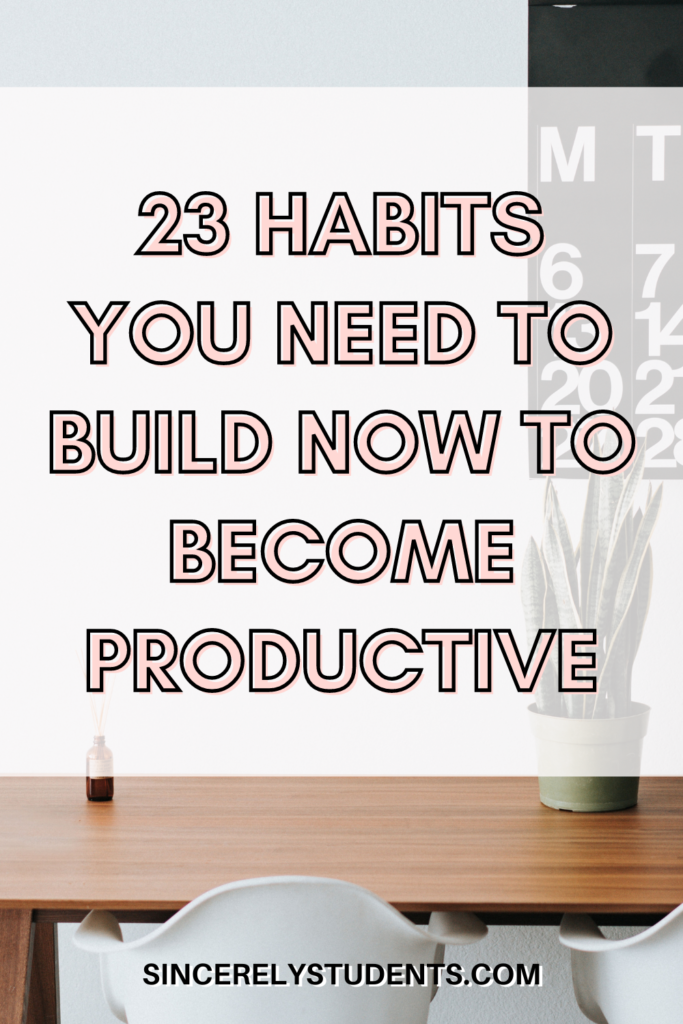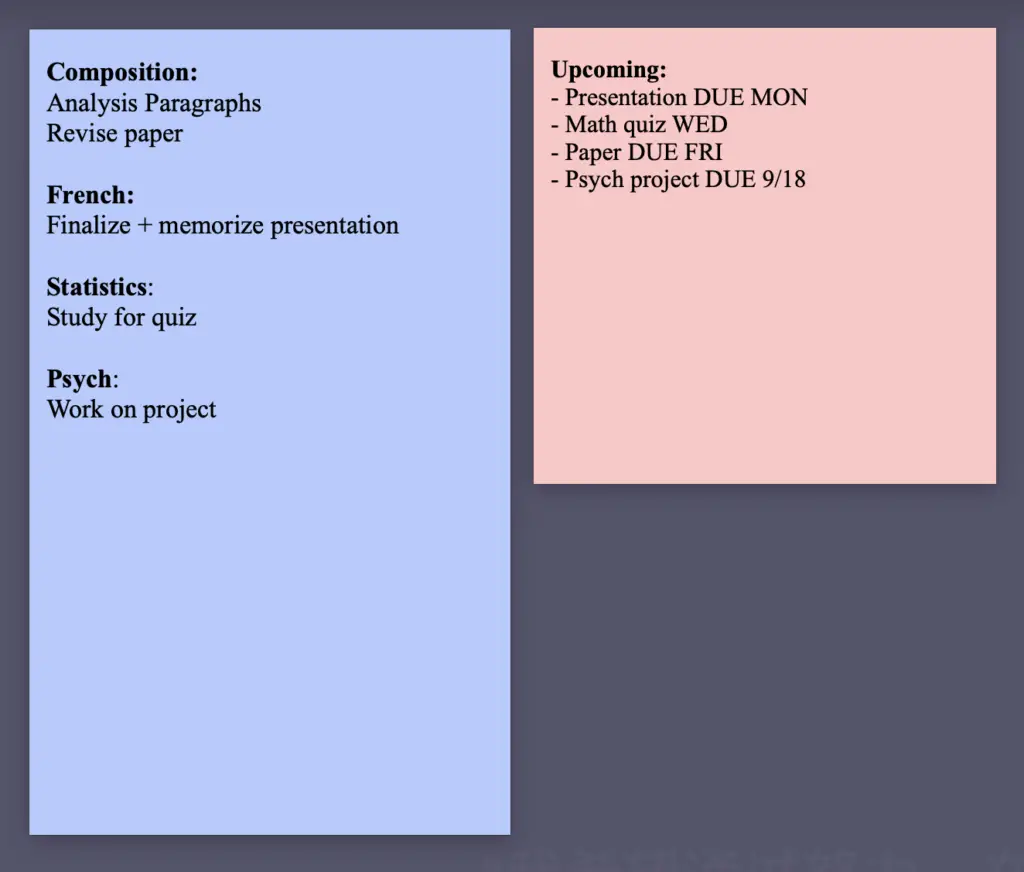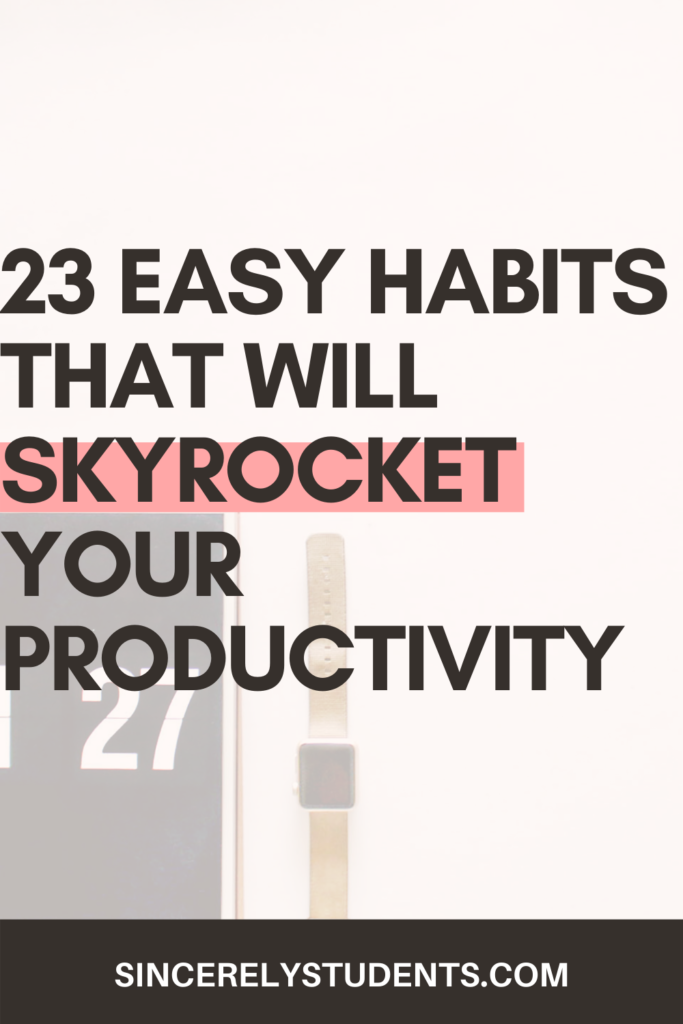When was the last time you felt truly productive? You woke up nice and early, feeling extremely motivated. You went about your day and got everything on your todo list done. You climbed into bed before 12 am and even read a chapter of the book on your bookshelf.
Wouldn’t it be nice if you were highly productive every single day? Well, productivity takes habits and routines, as well as time and perseverance.
In this post, you’ll learn what 23 habits you must build in order to skyrocket productivity. Let’s get into it!

Lifestyle
Plan the night before
Whether you’re a middle schooler or a college student, planning the night before is a crucial step to a productive next day.
Oftentimes, you don’t have enough time in the morning to plan out the day, set goals, get ready for school, etc. Instead, do all of this the night before!
Create a to-do list
Every day (or rather, every night before), create a to-do list detailing everything you need to do. These should not include what you already do on a daily basis (like brushing your teeth or walking the dog).
List out the homework you have to get done, what part of the project you have to start, etc. Be as detailed as possible and break them into multiple tasks if necessary.
Personally, I use a physical to-do list notepad to track the day’s tasks. It’s minimalistic and doesn’t require me to fill out everything about the day, which helps me stay on track with my tasks.
Create a not to-do list
A not to-do list is just as important as a to-do list in terms of productivity and staying on task. Simply list out the things you tend to do when distracted, and aim to not do them while focusing!
For example, you could list some of the following:
- Don’t go on Instagram until I finish my essay.
- Don’t watch Netflix until I get into bed.
- Don’t watch YouTube until I finish all my homework.
- And more!
Wake up early
Waking up early is difficult, but it’s a crucial step to ensuring a productive day. It gives you more time to prepare for the day, reduces stress, and is the optimal time for brain activity.
The perfect time to wake up should be at least 1 hour before your classes start. For me, this is 7:30 am. This means that to get a good amount of sleep (around 8 hours), I need to sleep before 11:30 pm.
Figure out when the optimal time to wake up is for you (it should be between 5 am and 9 am), then adjust your sleep schedule accordingly.
Have a morning routine
The morning is often the most relaxing and abundant time for me. The busyness of the day has not yet reached me, and I have time to do things for myself.
A healthy and productive morning routine will set you up for an equally productive and successful day. And if you build a consistent routine that you follow every day, you’ll be able to ensure a super productive day every day!
If you’re not sure how to create the perfect morning routine for yourself, check out these posts:
“Eat the frog”
In other words, always do the most difficult task first.
Go through your to-do list in the morning and decide which task you really do not want to do. Choose the one you dread the most, and get started on it.
Once you finish that task, you’ll feel accomplished and relieved, and after a short break, will be able to get going with the now much-easier tasks.
Block your time
Time-blocking is something I harp on in almost all of my productivity posts. Time-blocking is essential for anyone who wishes to be super productive. And it’s so easy!
Simply spread your to-do list over the time you’re awake and create blocks of time for each task. Don’t forget to schedule breaks as well!
You can do this on a physical planner or a digital calendar. Some like using a planner to get all the nitty-gritty details down, while others like a digital calendar for its ease of use.
Stack tasks
Stacking habits and tasks is something I’ve been doing for a while, but just realized the effectiveness of. In simple words, stacking tasks is telling yourself…
“After I do this, I will do that.”
That’s it! It’s a super easy yet effective way to streamline your day and boost productivity. It’s also an insanely powerful way to build new habits.
Multitask when able
It’s not a good idea to multitask when one of the tasks needs your full attention. For example, if you’re writing an essay, don’t multitask. If you’re taking a mock math test, don’t multitask.
But if you’re doing some relatively “chill” tasks, take the time to multitask and do something productive! For example…
- Listen to a motivating podcast while making breakfast.
- Read the news while eating lunch.
- Memorize a few vocabulary words while working out.
Stay healthy
You can’t be productive if you’re sick, sleep-deprived, tired, etc. So before you take care of your todo lists, take care of yourself!
Here are some healthy habits to take up:
- Get at least 8 hours of sleep every night.
- Stay hydrated!!!
- Always eat breakfast.
- Take a short walk every day.
- Get up and stretch after a long time at your desk.
- Take naps when you need them.
Studying
While all these habits mentioned above apply to studying as well, there are some more specific tips that will truly maximize your study time.
Plan ahead
Just as I mentioned in my previous post, The Easiest Way To Maximize Your Next Study Session, planning ahead is crucial to studying productively and effectively.
Before you even begin studying, determine the following things:
- What you need to study.
- Who you will study with.
- When you will study.
- How you will study.
- Where you will study.
Implement this 5-step process and you’ll be ready to be super organized and productive while studying.
Eliminate distractions
I’ll be very blunt about this: telling yourself not to go on Instagram or Youtube while studying simply doesn’t cut it.
You need to proactively remove those distractions or remove yourself from those distractions to really ensure productivity.
One of the most severe distractions for students is a smartphone, complete with social media notifications and games. If you want to learn how to break your phone addiction for good, check out this post:
Break things down
When you receive a large assignment or project, analyze it and break it down into smaller, more feasible tasks. This will help you reduce stress while studying and stay on track more easily.
For example, if you receive an assignment to write a 5 paragraph essay in one week, immediately break down the assignment into…
- Deciding on a topic/thesis.
- Finding evidence for your argument.
- Writing the introduction.
- Writing the body paragraphs.
- Writing the conclusion.
- Proofreading and finalizing.
This will help you track your progress and complete your assignment on time and confidently.
Set goals
When you see the word “goals”, do you think of long-term goals like earn a million dollars or get into Harvard University?
Those are perfectly reasonable goals. But what I’m emphasizing right now is short-term goals. You must set small stepping stones while you study that help you get through everything effectively.
These go hand-in-hand with breaking tasks down. Your goals should be as simple as read chapter 11 in the textbook or write 1 paragraph of my essay. These small, reachable goals are what will help you reach your bigger goals.
One thing at a time
Studying is generally not a good time for multitasking. You should be putting all your energy and concentration into the task at hand in order to maximize productivity.
So while you’re studying, zone out everything else and focus on the assignment you’re working on. Of course, sudden thoughts may pop up and break your concentration. This is where the next tip, a distraction list, comes in.
Keep a distraction list
Sometimes while studying, you get sudden realizations or reminders about an email you have to reply to, or a project you need to delegate to a classmate.
But instead of breaking your concentration to do that thing that popped up, quickly jot it down on a notepad then get back to work.
Once you’re done with the task at hand, refer to your distraction list and quickly do the things that are listed there. This helps ensure you’re not missing anything important, but are still staying productive.
Create systems
Everyone studies their own way and has systems that are unique to themselves. Although it can take some trial-and-error, always take the time to figure out your best system of studying.
Some systems include minimalistic systems, digital systems, color-coded systems, binder systems, notebook systems… you name it. Customize it for yourself for it to be most effective!
Use music strategically
Some students find that listening to music helps with focusing, while others find it distracting. Oftentimes, I listen to lofi music when doing homework, and occasionally ambiance when concentrating hard.
Here is an example of an ambiance video I listen to often:
Take breaks
Breaks are super important to help you “reboot” your brain after long periods of studying. I like to use a variation of the Pomodoro method, where I study for around 30 minutes (or until I finish one part of an assignment) and then take a 5-10 minute break.
It’s important to try and not take breaks until you’ve finished a certain amount of work. Some like to stay strictly with the 25-5-25 minutes rule, but I find myself to be more productive when I measure by the amount of work done instead of time passed.
YOU’LL LOVE THIS POST: 7 Secrets Successful Students Will Never Tell You
Organization
Staying organized is another large part of being productive. The following tips will help you organize your physical and digital space. However, if you’d like to read a more extensive guide, check out this post:
Clean your workspace
Whether you’re working at the dining table, in a study, or at your desk (hopefully not in your bed), a clean and tidy workspace is essential.
Decluttering your space helps declutter your mind, and you will subsequently become more focused and productive. You can check out my top tips by visiting my post, How To Set Up Your Desk For Maximum Productivity.
The Marie Kondo method
What I learned from the Marie Kondo method is to create an environment that makes you happy.
Not everything in your room or workspace will spark joy. Keep only the items that will help you stay productive and/or make you happy. Discard or hide the rest, and you’ve got yourself an ideal work environment.
Organize your computer desktop
Digital organization is just as important as physical organization. Now that many students are taking online classes, decluttering your computer desktop is something everyone should do.
I enjoy using Stickies (on my MacBook) to create todo lists and keep track of upcoming due dates. I also use folders to keep important files. This is my favorite way to organize my digital space.

Create folders for your bookmarks
As online classes continue, I find that there are many many websites I keep going back to. Instead of having a large amount of “loose” bookmarks, I keep them in organized folders.
Here are a few of my bookmarks and folders:
- Google Calendar (individual)
- Google Keep (individual)
- Email (individual)
- School (folder with sub-folders for each of my classes)
- Google (folder for quick access to Drive, Docs, Slides, etc)
- Learning (folder with bookmarks to extracurricular online courses and resources)
Conclusion
I hope these productivity habits will help you become a highly productive and efficient student! Leave a comment with your favorite from this list or your own productivity tip!
If you’re looking for more posts like this, give these a shot:
- The Easiest Way To Maximize Your Next Study Session
- Ultimate 5 Day Guide To Become Insanely Productive
- 7 Secrets Successful Students Will Never Tell You
